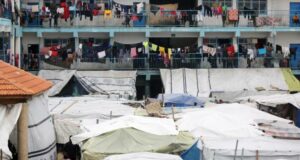Freedom Flotilla | Witness Gaza
FOR IMMEDIATE RELEASE

Israeli disinformation cannot hide the siege of Gaza.
For over four years, Israel has subjected the civilian population of Gaza to an increasingly severe blockade, resulting in a man-made humanitarian catastrophe of epic proportions. Earlier this month, John Ging, the Director of Operations of the UN Relief and Works Agency for Palestine Refugees (UNRWA) in Gaza, called upon the international community to break the siege on the Gaza Strip by sending ships loaded with humanitarian aid. This weekend, 9 civilian boats carrying 700 human rights workers from 40 countries and 10,000 tons of humanitarian aid will attempt to do just that: break through the Israel’s illegal military blockade on the Gaza Strip in non-violent direct action. In response, the Israeli government has threatened to send out ‘half’ of its Naval forces to violently stop our flotilla, and they have engaged in a deceitful campaign of misinformation regarding our mission.
Israel claims that there is no ongoing humanitarian crisis in Gaza. Every international aid organization working in Gaza has documented this crisis in stark detail. Just released earlier this week, Amnesty International’s Annual Human Rights Report stated that Israeli’s siege on Gaza has “deepened the ongoing humanitarian crisis. Mass unemployment, extreme poverty, food insecurity and food price rises caused by shortages left four out of five Gazans dependent on humanitarian aid. The scope of the blockade and statements made by Israeli officials about its purpose showed that it was being imposed as a form of collective punishment of Gazans, a flagrant violation of international law.”[1]
Israel claims that its blockade is directed simply at the Hamas government in Gaza, and is limited to so-called ‘security’ items. Yet When U.S. Senator John Kerry visited Gaza last year, he was shocked to discover that the Israeli blockade included staple food items such as lentils, macaroni and tomato paste.[2] Furthermore, Gisha, the Israeli Legal Center for Freedom of Movement, has documented numerous official Israeli government statements that the blockade is intended to put ‘pressure’ on Gaza’s population, and collective punishment of civilians is an illegal act under international law.[3]
Israel claims that if we wish to send aid to Gaza, all we need do is go through ‘official channels,’ give the aid to them and they will deliver it. This statement is both ridiculous and offensive. Their blockade, their ‘official channels,’ is what is directly causing the humanitarian crisis in the first place.
According to former U.S. President Jimmy Carter: “Palestinians in Gaza are being actually ‘starved to death,’ receiving fewer calories per day than people in the poorest parts of Africa. This is an atrocity that is being perpetrated as punishment on the people in Gaza. It is a crime… an abomination that this is allowed to go on. Tragically, the international community at large ignores the cries for help, while the citizens of Gaza are treated more like animals than human beings.”[4]
Israel claims that we refused to deliver a letter and package from POW Gilad Shalit’s father. This is a blatant lie. We were first contacted by lawyers representing Shalit’s family Wednesday evening, just hours before we were set to depart from Greece. Irish Senator Mark Daly (Kerry), one of 35 parliamentarians joining our flotilla, agreed to carry any letter and to attempt to deliver it to Shalit or, if that request was denied, deliver it to officials in the Hamas government. As of this writing, the lawyers have not responded to Sen. Daly, electing instead to attempt to smear us in the Israeli press.[5] We have always called for the release of all political prisoners in this conflict, including the 11,000 Palestinian political prisoners languishing in Israeli jails, among them hundreds of child prisoners.[6]
Most despicably of all, Israel claims that we are violating international law by sailing unarmed ships carrying humanitarian aid to a people desperately in need. These claims only demonstrate how degenerate the political discourse in Israel has become.
Despite its high profile pullout of illegal settlements and military presence from Gaza in August—September 2005, Israel maintains “effective control” over the Gaza Strip and therefore remains an occupying force with certain obligations.[7] Among Israel’s most fundamental obligations as an occupying power is to provide for the welfare of the Palestinian civilian population. An occupying force has a duty to ensure the food and medical supplies of the population, as well as maintain hospitals and other medical services, “to the fullest extent of the means available to it” (G IV, arts. 55, 56). This includes protecting civilian hospitals, medical personnel, and the wounded and sick. In addition, a fundamental principle of International Humanitarian Law, as well as of the domestic laws of civilized nations, is that collective punishment against a civilian population is forbidden (G IV, art. 33).
Israel has grossly abused its authority as an occupying power, not only neglecting to provide for the welfare of the Palestinian civilian population, but instituting policies designed to collectively punish the Palestinians of Gaza. From fuel and electricity cuts that hinder the proper functioning of hospitals, to the deliberate obstruction of humanitarian aid delivery through Israeli-controlled borders, Israel’s policies towards the Gaza Strip have turned Gaza into a man-made humanitarian disaster. The dire situation that currently exists in Gaza is therefore a result of deliberate policies by Israel designed to punish the people of Gaza. In order to address the calamitous conditions imposed upon the people, one must work to change the policies causing the crisis. The United Nations has referred to Israel’s near hermetic closure of Gaza as “collective punishment,”[8] strictly prohibited under Article 33 of the Fourth Geneva Convention. All nations signatory to the Convention have an obligation to ensure respect for its provisions.[9]
Given the continuing and sustained failure of the international community to enforce its own laws and protect the people of Gaza, we strongly believe that we all, as citizens of the world, have a moral obligation to directly intervene in acts of nonviolent civil resistance to uphold international principles. Israeli threats and intimidation will not deter us. We will sail to Gaza again and again and again, until this siege is forever ended and the Palestinian people have free access to the world.
NOTES:
- Amnesty International, Annual Human Rights Report (26 May 2010); http://thereport.amnesty.org
- “The pasta, paper and hearing aids that could threaten Israeli security,” The Independent (2 March 2009)
- “Restrictions on the transfer of goods to Gaza: Obstruction and obfuscation,” Gisha (January 2010)
- “Carter calls Gaza blockade ‘a crime and atrocity,” Haaretz (17 April 2008), http://www.haaretz.com/news/carter-calls-gaza-blockade-a-crime-and-atrocity-1.244176
- “Gaza aid convoy refuses to deliver package to Gilad Shalit,” Haaretz (27 May 2010)
- “Comprehensive Report on Status of Palestinian Political Prisoners,” Sumoud (June 2004); Palestinian Children Political Prisoners, Addameer, http://www.addameer.org/detention/children.html
- Article 42 of the Hague Regulations stipulates, a “territory is considered occupied when it is actually placed under the authority of the hostile army,” and that the occupation extends “to the territory where such authority has been established and can be exercised.” Similarly, in the Hostage Case, the Nuremburg Tribunal held that, “the test for application of the legal regime of occupation is not whether the occupying power fails to exercise effective control over the territory, but whether it has the ability to exercise such power.” Palestinians living in the Gaza Strip, like those in the West Bank, continue to be subject to Israeli control. For example, Israel controls Gaza’s air space, territorial waters, and all border crossings. Palestinians in Gaza require Israel’s consent to travel to and from Gaza, to take their goods to Palestinian and foreign markets, to acquire food and medicine, and to access water and electricity. Without Israel’s permission, the Palestinian Authority (PA) cannot perform such basic functions of government as providing social, health, security and utility services, developing the Palestinian economy and allocating resources.
- John Holmes, Briefing to the U Security Council on the situation in the Middle East, including the Palestinian question, 27 January 2009.
- Convention (IV) relative to the Protection of Civilian Persons in Time of War. Geneva, 12 August 1949, Article I stating, “The High Contracting Parties undertake to respect and to ensure respect for the present Convention in all circumstances.” See also, Legal Consequences of the Construction of a Wall in the Occupied Palestinian Territory, Advisory Opinion, I. C. J. Reports 2004, p. 136 at 138; http://www.icj-cij.org/docket/files/131/1671.pdf.
 International Solidarity Movement Nonviolence. Justice. Freedom.
International Solidarity Movement Nonviolence. Justice. Freedom.


